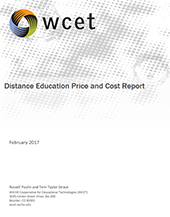Details
- Year Published : 2017
- Month Published : February

Summary
Based on conversations with legislators, administrators, faculty, students, and the public, WCET identified a need to better understand the economics of distance education courses. What do we charge students (the “price”)? How much does the institution spend to create the course (the “cost”)?
In 2017, WCET released a “Price and Cost of Distance Education” report that included a survey of distance education institutional leaders, interviews with experts on the economics of distance education, and highlights of the political and practical ramifications in one state – Florida.
In 2018, Change magazine published a WCET opinion piece titled: “The Economics of Distance Education: Boxing Match or Productive Dialogue, written by Russ Poulin and Terri Taylor Straut. Poulin and Taylor reported on the growing rift between policymakers (who steadfastly hold that distance education must be cheaper) and the distance education community. They recommend more dialogue to better align expectations.
WCET previously conducted research on this topic in the spring of 2012.
Findings included:
- There is great variability in distance education policies and practices.
- From the survey of institutional distance education leaders:
- Comparing face-to-face to distance prices: tuition is the same, but total price is more.
- Comparing face-to-face to distance costs: distance courses cost the same or more.
- From the survey and expert interviews:
- Distance education does not have to cost more.
- It is all about the mission. Distance education focused on access not cost and price.
- The cost price debate is getting political. Recent actions in Florida are reviewed.
- Going forward, let’s create a vision by working together.
Thank you to the following members of the WCET Steering Committee Price and Cost Working Group for their guidance, assistance, and review of this report:
- Joan Bouillon, Pearson and chair of the Working Group.
- Tom Cavanaugh, University of Central Florida.
- Preston Davis, Northern Virginia Community College.
- John Opper, Florida Virtual Campus.